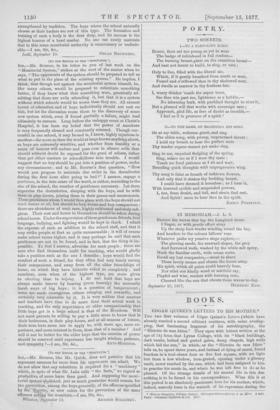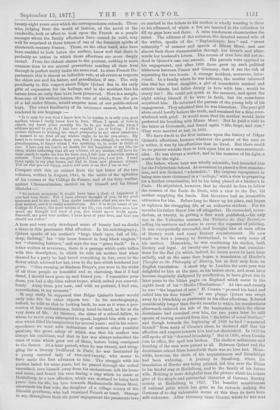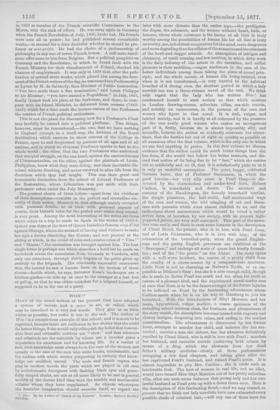BOOKS.
EDGAR QUINET'S LETTERS TO HIS MOTHER.* Tim two first volumes of Edgar Quinet's Letters (which have already reached a second edition) continue, with some overlap- ping, that fascinating fragment of his autobiography, the "Histoire de mes Ickes." They open with letters written at the age of 14 from that Lyons College, with its "black buildings, dark vaults, bolted and grated gates, damp chapels, high walls which hid the Bun," in which, as the " Histoire de mes Ides" tells us, he spent three years, and instead of dying of ennui, found freedom in'a tool-closet four or five feet square, with no light but from a low window, iron-grated, opening under a gloomy vault, never reached by the sun, which had been assigned to him to practise his music in, and where he was left free to do as he pleased. Of the strange details of his mental life in this den nothing is to be found in his correspondence. What fills it at this period is an absolutely passionate love for his mother, which, indeed, scarcely loses in the warmth of its expression during the CEuvres Completes d'Ettgar Quinet: Correspomlance—Lettres 4 sa APpe. 2 vols. Paris: Germain Beillline et Ole. 1877. twenty-eight years over which the correspondence extends. Those who, judging from the world of fashion, of the novel or the vaudeville, look or affect to look upon the French as a people amongst whom the family affections have ceased to exist, may well be surprised at these letters of one of the foremost spirits of nineteenth-century France. Those, on the other hand, who have been enabled to look below the surface, know well that there is probably no nation in which those affections are more deeply rooted. From the richest classes to the poorest, nothing is more common than to see several generations residing all their lives through in perfect amity under the same roof. In some French De- partments this is almost an inflexible rule, at all events as respects the eldest son and his father, and grandfather, if any. The only peculiarity in this respect about Edgar Quinet lies in his early gifts of expression for his feelings, and in the accident that his letters from an early date have been preserved. Here is a sample, from one of his earliest letters, the tone of which, from the pen of a lad under fifteen, would surprise most of our public-school boys. The sweet familiarity of its tutoiement cannot, indeed, be rendered in our language :— "It is only for you that I know how to be tender, it is only you, geed mother, whom I really know bow to love. When I speak of love to others, my heart gives secretly the lie to my words ; only when I address myself to you do I fool how capable I am of loving. I felt a certain distress in wishing too much prosperity to my other relations ; it Boomed to me that all my wishes ought to be for you alone. My heart is so frozen for others than you, that I was obliged, in writing to grandmamma, to forget whom I was speaking to, in order to think of you. I love you too much, no doubt, for the happiness of my life, for often, whilst reflecting that all nayfictions' all my studies, will have for their result to make me live far from you,I fail into a horrible state of sadness. Your letters do me great good, I hear you, I BOO you. I read them again in my play-hours, and find in them now pleasure always. Tell me that you are happy, and it will seem to me that .1 am so too."
Compare with this an extract from the last letter of the two volumes, written in August, 1845, in the midst of the agitation of his courses at the College do France, and of the fiery warfare against Ultramontanism, carried on by himself and his friend Michelet :—
"At certain moments,- it would have been a flash of happiness if you had been there. For I have always thought of you, in my good moments and in the bad. You doubt sometimes what you are for II10, dear mother, and it is really a misfortune. Ahl if in those hours of the College de France, the most serious of my life, you could have seen how much my thought had need of you, you would never doubt again. Farewell, my good dear mother, I have need of your love, and that you should not suffer."
A keen and very early developed sense of beauty had no doubt a share in this passionate filial affection. In his autobiography, Quinet speaks of his mother's "large black eyes, full of life, deep, flashing," her "fair brow framed in long black ringlets," her "charming features," and says she was "grace itself." In a letter written at seventeen, there is a passage which quite tallies with this description, in which he tells his mother that when dressed for a party he had loved everything in her, even to the flower which adorned her hat, even to the lace which bordered her gown. "One evening, at Madame Bruya's, you were in the midst of all these people so beautiful and so charming, that if I had dared, I should have gone up and kissed you. I remember your dress, you had a sky-blue velvet toque, which suited you marvel- lously. Away from you now, and with no portrait, I find one, nevertheless, in my memory." It may easily be supposed that Edgar Quinet's heart would early take fire for other objects too. In his autobiography, indeed, he tells us that in looking back, he sees as it were a pro- cession of fair enchantresses, linking hand-in-hand, as far as the very dawn of life. At thirteen, the sister of a school-fellow, to whom he never even attempted to speak, inspired him with a pas- sion which filled his imagination for several years ; and in his corre- spondence we meet with indications of various other youthful passions, the great safety of which was that his mother was always his confidant, and that to her was always submitted the mass of verse which grew out of them, before being consigned to the flames. At a later period, when he was twenty, and strug- gling for a literary livelihood in Paris, he was fascinated by a young married lady of two-and-twenty, who seems to have made the first advances to him. The struggle with his passion lasted for some years, but he passed through the ordeal unscathed, tore himself away from his enchantress, left his home and name, and found his cure during a stay which he made at Heidelberg, in a new affection, which was destined to bring back peace into his life, his love towards Mademoiselle Minna Mor6, afterwards his first wife, the daughter of a village notary of the Rhenish provinces, who had remained French at heart. Strange to say, throughout their six years' engagement the passionate love so marked in the letters to his mother is wholly wanting in those to his affianced, of which a few are inserted in the collection to fill up gaps here and there. A calm tenderness characterises the latter. The editress of the volumes, the devoted second wife of the writer, speaks of the " Raphaelesque face" and "sweet solemnity" of manner and speech of Minna More, and one almost feels these characteristics through her lover's and after- wards her husband's letters. The course of true love did not in- deed in Quinet's ease run smooth. His parents were opposed to his engagement, and after 1830 there grew up such political bitterness between France and Germany, that it ran the risk of separating the two lovers. A strange incident, moreover, inter- vened. In a family where he was intimate, the mother informed him that her eldest daughter, a girl of remarkable musical and artistic talents, had fallen deeply in love with him ; would he marry her? He could not speak at the moment, and spent the night asking himself if ho were in fault, but his conscience acquitted him. He informed the parents of the young lady of his engagement. They admitted that he was blameless. The poor girl alone could hardly believe the truth, and remained for a time over- whelmed with grief. It would seem that his mother would have preferred his breaking with Minna Mor6. But he paid a visit to the latter at Griinstadt, and found again "life, hope, and rest." They were married at last, in 1834.
We have dwelt in the first instance upon the history of Edgar Quinet's affections, because whatever the genius of the man as a writer, it was by his affections that he lived. But there could be no greater mistake than to look upon him as a mere sentiment- alist. He was always a worker, and in the measure of his light, a worker for the right.
His father, whose bent was wholly scientific, had intended him for the Polytechnic School. At seventeen he passed a first examina- tion, and was declared "admissible." His extreme repugnance to being once more cloistered in "college," with *.a view to preparing for a further examination, led to his being placed at a banker's in Paris. He stipulated, however, that he should be free to follow the courses of the Ecole do Droit, with a view to the Bar, his mother supplying the funds. But literature had an irresistible attraction for him. Before long he threw up his place, and began at eighteen the struggling life of an unknown student. For six months his father threw him off altogether. He succeeded, never- theless, at twenty, in getting a first work published,—his only one in the Yoltairian manner, the Tablettes du Ai/ Errant,— selling his mattress and chairs to cover the expenses of printing. It was unexpectedly successful, and brought him at once offers of literary work and many literary acquaintances. He now made on foot a journey to Switzerland, to the early home of his mother. Meanwhile, he was continuing his studies, both literary and legal. At twenty-one he passed his last examina- tions for the Bar (to which, indeed, he seems never to have been called), and at the same time began a translation of Herder's Thoughts on the Philosophy of History, but at first only from an English translation. A short trip to London the next year was delightful to him at the time, as his letters show, and must have become singularly disfigured by recollection, to have given rise in later years to the bitter pages on England which occur in the eighth book of his "Merlin l'Enchanteur." At two-and-twenty he was "the happiest of men." M. Cousin "pressed his hand and called him his dear friend." At one plunge Quinet was swept away by a friendship aa passionate as his other affections. It lasted considerably longer than the six months to which his recollections afterwards reduced the tale of the fascination which the clever doctrinaire had exercised over him, for two years later he still speaks of having received from him "the letter of a real brother," and though towards the beginning of 1828 he had "separated himself" from many of Cousin's ideas, he declared still that his affection and respect towards him had not diminished. In 1829 he still spoke of his "devoted friendship." But in 1830, when Cousin rose to office, the spell Was broken. 'The shallow selfishness and humbug of the man were patent to all. Between Quinet and tho doctrinaire school from henceforth there was no love lost. Mean- while, however, the circle of his acquaintances and friendships had been widening. A journey to Strasburg, where his translation of Herder was being printed, led him over the Rhine to his fateful stay at Heidelberg, and to the family of his future wife. Nothing is more delightful than the picture which his letters give of the simple and patriarchal character of German literary society at Heidelberg in 1827. The boastful sensitiveness of national pride which has gone so far towards making the Germans of to-day unbearable seems at this time to have been still unknown. After Germany came Greece, where he was sent in 1829 as member of the French scientific Commission to the Mores, with the rank of officer. He was away again in Germany when the French Revolution of July, 1830, broke out. His friends were now all in power ; he had published several remarkable works,—it seemed for a time doubtful whether he should be pro- fessor or sous-prefet. He had the choice of a professorship of philosophy in any one of seven French towns. A still more hand- some offer came to him from Belgium, But a political pamphlet on Germany and the Revolution, in which lie found fault with the French Ministry for their abandonment of Poland, checked his chances of employment. It was only in 1838 that, after the pub- lication of several more works, which placed him among the fore- most of the French writers of the day, he was named to a Professorship at Lyons by M. de Salvandy, then Minister of Public Instruction. "You have made there a fine nomination," said Louis Philippe to his Minister ; "you have named a Republican." In July, 1811, finally Quinet took his place at the Sorbonne, and there, in com- pany with his friend Michelet, he delivered those courses (18t2- 184G) which for a time made the lecture-rooms of two Professors the centres of French political enthusiasm.
This is not the place for discussing how far a Professor's Chair may lawfully be turned into a political platform. Two things, however, must be remembered,—the one, that we have nothing in England (except, in a small way, the lectures of the Royal Institution) which answers to those courses of the College do France, open to and frequented by persons of all ages and of all nations, and in which an eloquent Professor speaks in fact to the whole world ; the other, that the two Professors who undertook that unequal struggle, on the one band, against the encroachments of Ultramontanism, on the other, against the platitude of Louis- Philippism, knew what they were doing, met their inevitable dis- missal without flinching, and never swerved in after-life from the doctrines which they had taught. This was their great and honourable distinction from the school of Liberal Professors of the Restoration, whose Liberalism was put aside with their professors' robes under the July Monarchy.
The greatest charm of these letters—apart from the vividness of their descriptions—consists in the perfect and crystalline sin- cerity of their writer. Hence it is, that although mainly occupied with personal details, or at least with personal aspects of events, their historic value for the period over which they extend, is very great. Among the most interesting of the series are those which relate to a trip lie made to Spain in the winter of 181:3-4. Q,uinet was there at the time of Queen Isabella's famous coup cre'tai against Olozaga, whom she accused of having used violence to make her sign a decree dissolving the Cortes ; and was present at the sitting at which, in the midst of cries and counter-cries of "Viva!" and " Muera! "the accusation was brought against him. The best single letter is perhaps one which describes a bold-cut he made on horseback across the mountains, from Grenada to Cordova, with only one attendant, through thirty leagues of by-paths given up entirely to the brigands. His constantly successful manoeuvre was, the instant he saw a human form on the horizon of those sierras—beside which, he says, Salvator Rosa's landscapes are a kitchen-garden—to ride up at once to the stranger at a fast trot or gallop, so that he was either mistaken for a brigand himself, or supposed to be in the van of a party.
































 Previous page
Previous page